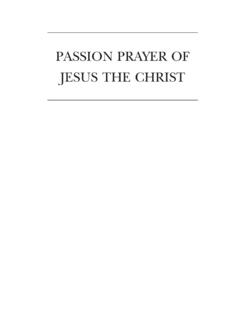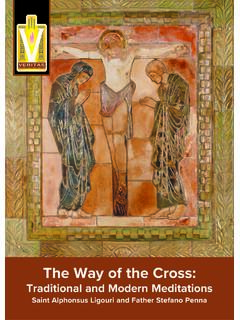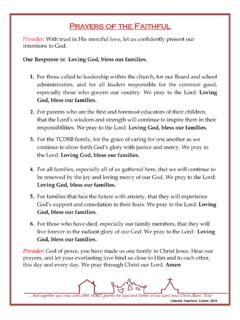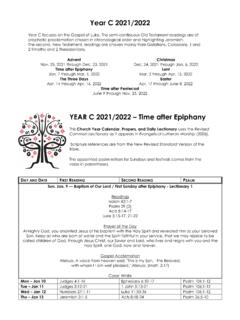Transcription of Jesus, the Mediator of the New Covenant
1 608 jesus , the Mediator of the New CovenantSabbath afternoonRead for This Week s Study: Heb. 7:11 19; Heb. 8:10 12; Jer. 31:31 34; Heb. 8:1 6; Exod. 24:1 8; Ezek. 36:26, Text: But as it is, christ has obtained a ministry that is as much more excellent than the old as the Covenant he mediates is better, since it is enacted on better promises (Hebrews 8:6, ESV).By living a perfect life, and then by dying in our place, jesus mediated a new, better Covenant between us and God. Through His death, jesus canceled the penalty of death that our tres-passes demanded and made possible the new truth is explained in Hebrews 10:5 10, which identifies jesus as having manifested the perfect obedience required by the Covenant . It references Psalm 40, referring to the Messiah s desire to render to God total obedience: Behold, I have come; in the scroll of the book it is written of me: I delight to do your will, O my God; your law is within my heart (Ps.)
2 40:7, 8, ESV). In the original context this phrase [ to do your will ] described moral obedience to the will of God. The author of Hebrews uses the phrase to show that the sacrifice of christ fulfilled the will of God in providing an acceptable atonement, which the animal sacrifices had not provided. The SDA Bible Commentary, vol. 7, p. Paul, this psalm acquired special significance with the incarna-tion of jesus . jesus embodied the obedience of the new Covenant . He is our Example. We have been saved, not only because of His death but also because of His perfect obedience.* Study this week s lesson to prepare for Sabbath, February 19.*February 12 18 Lesson61 February 13 The Need of a New CovenantRead Hebrews 7:11 19. Why was a new Covenant needed? _____ _____According to Hebrews, the fact that jesus was appointed Priest according to the order of Melchizedek implied that a new Covenant had been inaugurated.
3 The old Covenant had been given on the basis of the Levitical priesthood (Heb. 7:11, NASB). The Levitical priests acted as mediators between God and Israel, and the law excluded anyone else from the priesthood. The author concludes, then, that a change of priesthood implies a change of the law of the priesthood, as well as the change of the Covenant (Heb. 7:12, 18, 19).The issue with the old Covenant was that it could not provide perfec-tion (Heb. 7:11). Paul is talking about the Levitical priesthood and its ministry (sacrifices, feasts, etc.). The animal sacrifices offered through them could not provide true, total cleansing from sin, or access to God (Heb. 10:1 4; Heb. 9:13, 14; Heb. 10:19 23).The fact that a new Covenant was necessary does not mean that God was unfair with Israel when He gave them the old Covenant . The Levitical ministry and the services of the tabernacle were designed to protect them from idolatry and also to point them to jesus future min-istry.
4 Hebrews stresses that the sacrifices were a shadow of the good things to come (Heb. 10:1, NKJV).By pointing them to jesus , the sacrifices should have helped the people put their hope and faith in the lamb of God who takes away the sin of the world (John 1:29, NKJV; compare with Isaiah 53). This is the same point that Paul makes when he says that the law was our tutor to lead us to christ , so that we may be justified by faith (Gal. 3:24, NASB) or that christ is the culmination of the law so that there may be righteousness for everyone who believes (Rom. 10:4, NIV).In other words, even the Ten Commandments, as good and perfect as they are, cannot provide salvation (Rom. 3:20 28, Rom. 7:12 14). They provide a perfect standard of righteousness, but they do not provide righteousness, any more than looking in a mirror can erase the wrinkles of age.
5 For perfect righteousness, we need jesus as our can t the law save us? After all, if we keep all the command ments, and keep them well even flawlessly why shouldn t that save us? _____sunday62 February 14 New and RenewedCompare Hebrews 8:10 12 with Deuteronomy 6:4 6, Deuteronomy 30:11 14, and Jeremiah 31:31 34. What does this teach us about the nature of the new Covenant ? _____ _____The promise of a new Covenant in Hebrews refers back to Jeremiah. According to Jeremiah, God s promise of a new Covenant was, in fact, a renewal of the Covenant that He had first made with Israel through Moses (Jer. 31:31 34). It could be argued, then, that Jeremiah 31 was not strictly speaking of a new Covenant but of a renewal of the origi nal Covenant with Israel. In fact, the Hebrew word for new, hadashah, can have both the sense of renew and brand new.
6 The issue with the old Covenant was that the people broke it (Heb. 8:8, 9). The Covenant was not faulty; the people were. If Israel had seen through the symbols to the coming Messiah and put their faith in Him, the Covenant would not have been broken. Yet, to be fair, there were many believers throughout Israelite history in whom the purposes of the Covenant were fulfilled and who had the law in their hearts (Ps. 37:31, Ps. 40:8, Ps. 119:11, Isa. 51:7).While the new Covenant is a renewal of the old Covenant , there is a sense in which it is, indeed, new. Jeremiah s promise of a new cove-nant did not simply envision a renewal of the conditions that existed before the exile, which had been broken and renewed several times because the nation had lapsed several times into apostasy. And that s because the people were simply unwilling to keep up their end of the Covenant with God (Jer.)
7 13:23).Instead, God promised to do a new thing (Jer. 31:22). The Covenant would not be like the Covenant that God had made with their fathers (Jer. 31:32). Because of the unfaithfulness of the people, the promises that God made under the Mosaic Covenant were never fulfilled. Now, in virtue of the guarantee given by the Son (Heb. 7:22), God would fulfill the purposes of His Covenant . God did not change His law or lower His standards; instead, He sent His Son as a guarantee of the Covenant promises (Heb. 7:22, Heb. 6:18 20). This is why this Covenant does not have curses. It has only bless-ings because jesus fulfilled it perfectly, becoming a curse for us (Gal. 3:13).Read 2 Timothy 2:13. What can we learn from God s faithfulness to His people and to His plans as we consider our relationships with others and our plans? _____Monday63 The New Covenant Has a Better Mediator Read Hebrews 8:1 6.
8 Why is jesus a better Mediator of the Covenant ? _____ _____The Greek term mesit s ( Mediator ) derives from mesos ( middle ) and denotes the one who walks or stands in the middle. It was a tech-nical term that referred to a person who fulfilled one or more of the following functions: (1) an arbiter between two or more parties, (2) a negotiator or business broker, (3) a witness in the legal sense of the word, or (4) one who stands as a surety and, thus, guarantees the execu-tion of an English term Mediator is too narrow a translation for mesit s in Hebrews because it focuses only on the first two or three uses of the Greek term. Hebrews, however, emphasizes the fourth function. jesus is not con-ceived of as Mediator in the sense that He settles a dispute between the Father and humans or as a peacemaker who reconciles parties in disaffec-tion or as a witness who certifies the existence of a contract or its satisfac-tion.
9 Instead, as Hebrews explains, jesus is the Guarantor (or Surety) of the new Covenant (Heb. 7:22). In Hebrews, the term Mediator is equivalent to guarantor. He guarantees that the Covenant promises will be s death makes the institution of the new Covenant possible because it satisfies the claims of the first Covenant with Israel (and even with the first humans in Eden), which had been broken (Heb. 9:15 22). In this sense, jesus is the Guarantor who took upon Himself all the legal obligations of the Covenant that had been broken. In another sense, jesus exaltation in heaven guarantees that God s promises to human beings will be fulfilled (Heb. 6:19, 20). jesus guarantees the Covenant because He has shown that God s promises are true. By resur-recting jesus and seating Him at His right hand, the Father has shown that He will resurrect us and also bring us to is a greater Mediator than Moses because He ministers in the heavenly sanctuary and has offered Himself as a perfect sacrifice for us (Heb.)
10 8:1 5, Heb. 10:5 10). Moses face reflected the glory of God (Exod. 34:29 35), but jesus is the glory of God (Heb. 1:3, John 1:14). Moses spoke with god face to face (Exod. 33:11), but jesus is God s Word personified (Heb. 4:12, 13; John 1:1 3, 14).Yes, christ has satisfied the demands of the Covenant for obedi ence. In this light, what is the role of obedience in our life, and why is it still so important? _____TuesdayFebruary 1564 February 16 The New Covenant Has Better PromisesWe may be tempted to think that the new Covenant has better prom-ises in the sense that it has greater rewards than the old Covenant had (a heavenly homeland, eternal life, etc.). The truth is that God offered the same rewards to Old Testament believers as He has offered us (read Heb. 11:10, 13 16). In Hebrews 8:6, the better promises refer to dif-ferent kinds of Covenant between God and Israel was a formal exchange of promises between God and Israel.
















